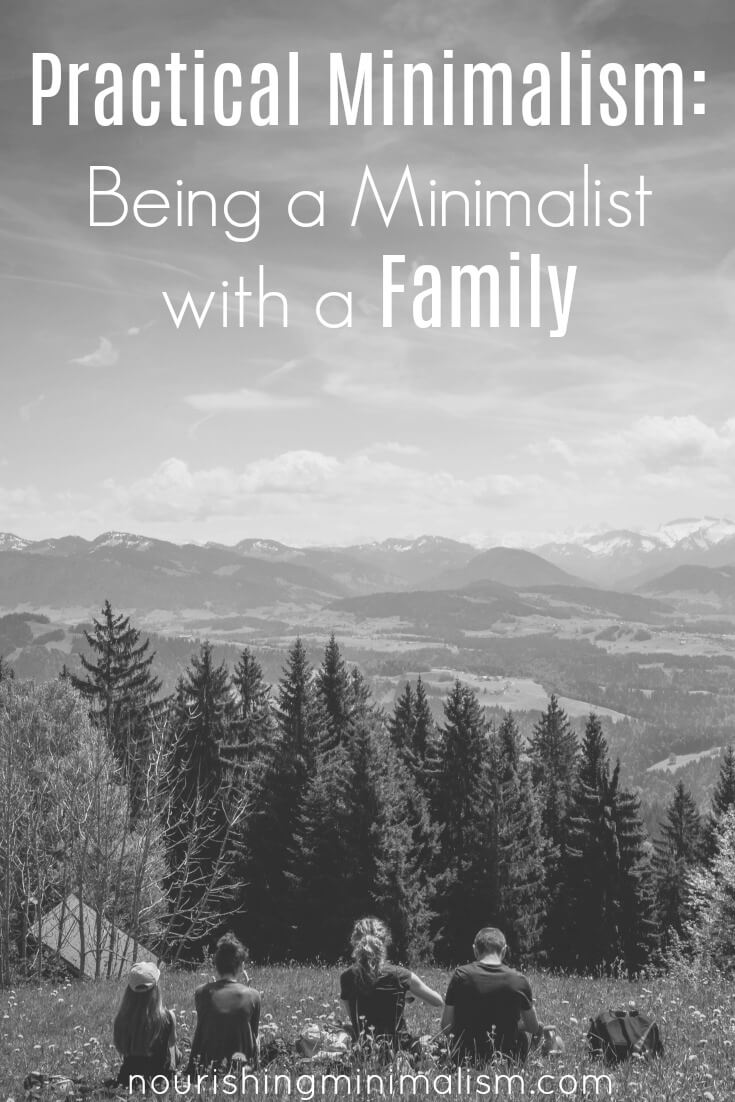Practical Minimalism: Being a Minimalist with a Family

If you close your eyes and visualize “minimalism,” what do you see?
- An empty home with stark, white walls?
- A platform bed on the floor, or perhaps just a mattress? Maybe one white blanket and one pillow?
- A teeny, tiny home with little or no decor?
- Someone traveling across the country with a handful of possessions in a backpack?
Maybe minimalism looks like this for some people, but certainly not for all minimalists.
Minimalism with a family
Sure, if I was single, I could live in a tiny home with an extreme minimal amount of stuff, but that’s completely impractical with a family.
We need to get away from the idea that minimalism is only having a very tiny amount of stuff. If you get that idea stuck in your head, you’ll likely end up in one of these situations:
- You won’t start on the path towards minimalism to begin with.
- You’ll live in frustration, because you’ll get rid of very useful things and end up living an uncomfortable life that’s harder than it needs to be.
- You’ll throw your hands up and quit, because you can’t quite get to the desired minimal number of items you feel “qualifies’ you to be a minimalist.
Find the sweet spot
Minimalism, for most of us, means finding that sweet spot, that right number of items for our needs. It’s not getting rid of everything for the sake of having nothing.
Minimalism needs to be practical to work for families; it’s not having so little that your life is hard or unpleasant.
For example,
- I want enough clothing that I don’t have to do laundry every single evening to have the right clothes clean for the next day. But I do limit it to a reasonable, minimal amount for our needs.
- I’m not going to have so little food in the house that I have to run to the store daily in order to keep everyone fed. But I keep food simple.
- I’m not going to get rid of all the games in our home, because my family enjoys playing them together.
- You’re also not going to find much white in my home (aside from some walls and the painted hardwood floor). I have kids; I’m not going to spend all day fretting about keeping it white. Plus, I enjoy color.
Key things to remember
Here are some things to consider to stay on track toward a practical minimalist journey:
Minimalism is a mindset, not a number
Minimalism is a mindset that you embody, not a set number of items remaining and suddenly you have arrived: “You’re now officially a minimalist!” Minimalism works for even the largest of families because it is a mindset where you keep only the things you need and use regularly.
Minimalism is identifying the things that add value to your life, and removing the things that take away from it.
Minimalism is personal
It’s common to get an idea in our minds of what minimalism should or shouldn’t look like, but it’s important to realize that every person, and every family, is going to embrace minimalism differently.
So many factors go into determining what minimalism will look like for each one of us. We have different dreams, jobs, education choices, goals, hobbies, lifestyles, locations, and preferences for the number of items in our homes.
The things you value and choose to keep are going to be different than the things I value and choose to keep.
- A mom who homeschools her children naturally needs books and supplies to educate her children from home
- If you enjoy a particular craft, that means crafting supplies are going to be important to you, although you will pare down substantially and learn how to keep only what you really use and love
- For a single person that enjoys the outdoors and travel, minimalism may really mean a backpack full of possessions, biking cross-country. But if you’re traveling cross country with a baby, your needs are going to be a lot different. If you’re traveling cross country as a family of eight, well, that’s going to look a lot different too.
Minimalism is about improving quality of life
Minimalism is about making your life better. If you’re getting rid of things by the truckload, and your life is getting more unpleasant and more difficult, instead of easier and more peaceful, your minimalist mindset may need a dose of practicality.
I’m not talking keeping things “just in case” here or advocating that you keep things, I’m referring to the idea of minimalism where you feel you have to get rid of every single thing, or you’re not really a minimalist.
Ask yourself these questions when you’re not sure about something:
- Does the item meet a basic need?
- Do you use it on regular basis?
- Does the item simplify your life?
- What would your life look like without it?
- Are you able to maintain it?
- Does it have a home that makes sense?
Maybe you will have to keep more things than you would like at this point in your life, because they are a true need.
You’re still a minimalist, just a practical one; you understand and appreciate having less, and are able to let it go when it’s no longer a need.
How do you approach minimalism with a family? Have you ever taken it too far and ended up making your life more difficult?


Thank you for this. This is where all the people I talk to get hung up. I’m a minimalist, but I’m on my journey to minimalism. And my house has three children in it – it will never be bare and sparse, but intentional and functional. The things I choose to keep as I rid myself of clutter are intentionally kept because they add value, whether joy or simplicity or time saved to my life. My journey looks different than anyone else’s journey, and that’s okay.
Terrific article!
So where I am at right now.
I’m constantly purging my boxes and piles so the items that don’t get attention are sent out.
Thank you for the great read and helpful tips!
Cheers
Great article! For me being a minimalist is an ongoing process. As I change and as my life changes so does what I find necessary and of value change. I’m actually enjoying it! I have found its ok to get rid of but also to replace things! Certain items really do have a “shelf life”!
Minimalism with young children has its difficulties.
But that’s what makes it all the more important.
Children are so ridiculously marketed to it makes a simple trip to the store a battle or a teachable moment in excess consumerism.
I have going on 8 children. We homeschool. we love art, we love home made farm to table cooking. So, yes, we have more than your typical family seeking simplicity. The points you make, does it add value to our lives, does it make life easier, can we maintain it, does it have a home? these are the ones constantly on my mind. And if it does not meet these specs, can I get it out of the house without someone having a crisis :)…now that is the real question!
I donated a lot of toys when our 4th child was young. It was sad that she wasn’t playing with dolls, barbies, little people, etc. Her 3 older siblings were into electronics, so she eventually was too. I really regret getting her an IPad at age 7. However, she still loves reading and doing things outside… and will play with littlest pet shop toys once in awhile.